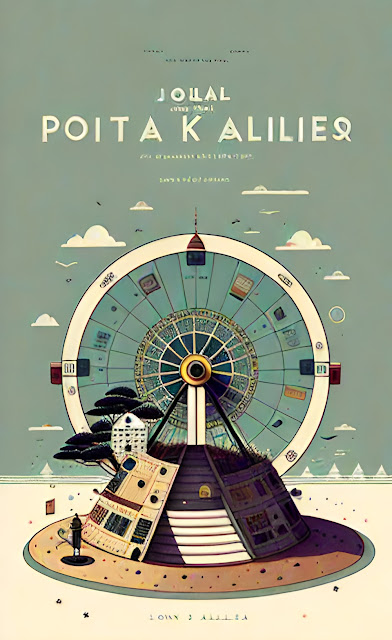In June, the Goblin's Henchman blog posted a cool idea for visualizing NPCs.
I’m often struck by how we try to help people by stuffing them full of words, when what they really need is a simple, elegant diagram (as someone who writes first and foremost, this was a tough thing to learn; but an important lesson all the same).
I really like this idea, but I knew that I would need something a little different for my own use. I need a tool that more specifically implies movement or development from one state to another. So my idea is something like this.
Spinning the Wheel of Values
I used an “emotion wheel” as a simple frame for what values might drive NPCs (a quick search will turn up many other examples of varying complexity). I don’t remember where I first saw these, but if you spend enough time thinking about RPGs, everything you encounter in the wild starts to look like a game mechanic or adjudication system. In addition to the Goblin’s Henchman post, this idea probably owes something to this old Sorcerer’s Skull post that I have cited before.
Remember that NPCs should not (generally) attempt to simulate the complexity of real people. They are game mechanisms meant to create interesting interactions with the PCs. Just a few emotions are enough to create an actionable character; more details just bog down action at the table.
For example, rolling to choose values randomly, I populate an NPC with Love (the innermost level); Affectionate and Longing (at the intermediate level); and Sentimental and Romantic (outermost level). With just those five ideas, I can already visualize this character. Affection and longing suggest they’re separated from what they love. They’re also romantic, so we’ll say this is a non-platonic kind of love. But they’re also sentimental, which suggests to me nostalgia; I interpret this as someone longing for a love they have lost; perhaps they were widowed.
Social interaction with this character happens like this. Love is the surface level. On a cursory interaction, this person is warm and caring. But if the interaction goes beyond the superficial – because the PCs need something from this NPC, for example – the NPC comes across either as affectionate or longing. Viewing the NPC as a game tool reactive to PC action, we might say that empathy, persuasion, and gift-giving pushes the NPC toward their affectionate mode, while coercion, logic, or appeals to authority are more likely to push this NPC into melancholic longing.
If the PCs deepen the interaction and succeed again in going "deeper" (more on “success” below) the interaction can advance to the outermost level. If the PCs had followed the longing path, it develops to sentimental (the widow tells their story, perhaps gaining some closure in the process). If the PCs’ actions had pushed the NPC more toward affection, further development moves into romance (whether directly, because a PC flirted with the widow; or indirectly, by reminding them of the virtue of loving again, perhaps by relating a similar experience in their own life).
Adversity and Variety
If the PCs fail – they badly misread the NPC, or otherwise act in a way that really pushes against the NPC’s core values – the wheel also suggests a response with the entries on the opposite side of the wheel. So a failure might reset the players back to the innermost circle, and push them to the opposite wedge. Imagine an NPC interaction that begins with Surprise, then develops to Stunned. At this point, the PCs mess up. They’re pitched back into the innermost circle, and now the NPC is dominated by Fear! The PCs will have to ameliorate the situation before they can return the NPC to their “natural” track.
The descending relationships implied by the wheel are helpful for restricting choices to a manageable range. But we’re not bound by the wheel’s structure. Let’s create a character that draws from the entire wheel. This character will probably be a bit more dramatic and unpredictable than our affectionate and sentimental widow.
Rolling randomly, I get Surprise (innermost circle); Despair and Proud (intermediate circle); and Contempt and Dismayed (Outermost Circle). Surprise suggests they’re in a state of turmoil and disruption when the PCs encounter them. Despair and pride are their two reactions to this turmoil; the PCs can push them toward one or the other. We can pair the outermost terms with whatever intermediate terms we like; let’s match despair with dismay, and pride with contempt. Encouraging PCs could push their feelings of despair into mere dismay; that’s a relative improvement! This person may be inherently pessimistic, but the PCs can at least cheer them up and get them from hopelessness to… modest hopes. Pride pairs well with contempt; no matter how their fortunes have fallen, this person considers themselves better than others. By stroking their ego, perhaps pitting them against a group they look down on, clever PCs convince them to do what they want.
Success in Any Social System
This approach is system-neutral by design, so “success” and “failure” can vary depending on the system. In a storytelling or FKR game, it can simply be GM judgment (or group consensus in a GM-less game). In a crunchier system, the appropriate ability check or equivalent test does the work of moving from state to state.
Obviously not everything the PCs do will slot neatly into the binary forks this system suggests. That’s fine. The GM can choose the option that is marginally closer, or just whichever seems to make sense in context. Remember, the purpose of the tool is not to provide a “right” or “correct” answer; it is to create a choice that moves the GM quickly toward the next step in the process and avoids analysis paralysis. It’s a shortcut for the GM to get to what they think is right, not a way of telling the GM what the correct answer is.





No comments:
Post a Comment